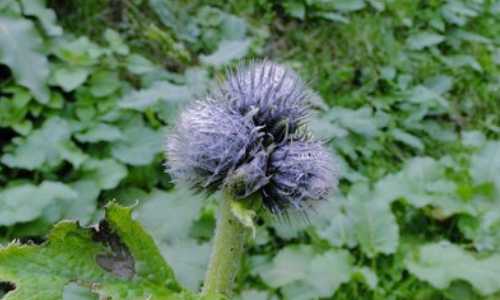Do you know that almost 30% of the world’s population has respiratory problems and almost 40% has skin issues once in a lifetime? Kushta offers natural remedies to those everyday issues and makes it possible to live a balanced, harmonious life. Kushta or Saussurea lappa is a potent herb that is used in Ayurveda to treat a variety of health conditions. It is a traditionally well-known drug for skin diseases, bronchial asthma, diarrhoea, haemorrhages and other related problems. The plant is generally tall and robust with purple or blue flowers. It grows well in the cold regions of India, China, and Pakistan; furthermore, it thrives in these climates due to their unique conditions. What is Kushta? Kushta is a botanical herbaceous plant. Found in the high altitude of the Himalayas, it is a perennial herb and is chiefly used as a medicine in Ayurveda. The uses are listed in Ayurvedic texts numerous times. Charaka Samhita and Sushruta Samhita – two of the well-known texts of Ayurveda emphasises on the usages of the herb as a medicine, especially in jirna jwara and other diseases. It helps balance Doshas and enhance Agni (digestive fire). It also helps in eliminating Ama (toxins) from the body, contributing to better digestion and detoxification. Benefits for Skin Health Kushta is highly beneficial for skin because of its soothing, anti-inflammatory, antibacterial and antimicrobial properties. Anti-inflammatory Properties: Reduces redness on the skin by making it healthy and hence fights conditions like Psoriasis and Eczema. Antimicrobial Effects: It has the characteristic to fight the infections; consequently, this helps in keeping the skin clean and healthy. Wound Healing: It also has healing properties and quickly cures wounds, cuts, burns and injuries. Detoxification: It aids in providing healthy glow to the skin through internal cleansing. Furthermore, it does so through internal cleansing. Due to its purifying properties, it purifies the blood and flushes the toxins out. Benefits for Respiratory Health This herb is, therefore, considered highly beneficial in improving respiratory health as well. It acts as an expectorant, bronchodilator and anti-asthmatic agent. Expectorant Action: It is helpful in loosening and getting rid of mucus which makes it easy to breathe. Bronchodilator: It widens the lumen of bronchi which makes the passage of air quite easy. Mainly, it results in the relaxation of the bronchial muscles; consequently, this leads to improved airflow. Anti- asthmatic: It has been used traditionally in the prevention of asthma. It helps in reducing the frequency of the attacks. For cough and sore throat: It has a soothing effect; therefore, it is helpful in getting relief from cough and sore throat. How to Use Kushta? It is used in various forms, depending on the condition being treated; furthermore, it may vary based on patient needs. Here are some common methods: Kushta Powder: The powdered root can be mixed with honey or water and consumed to treat respiratory issues. Kushta Oil: Applying this oil topically helps treat skin conditions and promote wound healing. Kushta Chatni: Kushta Chatni helps derive the maximum amount of nutrients from your meal. Kustha Decoction: A decoction made from its root, in fact, is great for detoxifying; moreover, it also provides respiratory benefits. Ayurvedic Recipes Using Kushta Here are some simple Ayurvedic recipes using Kustha that you can try at home for your health: Kushta Honey Mix for Cough: Mix 1 teaspoon of Kushta powder with 1 tablespoon of honey. Take this mixture twice a day to reduce cough and respiratory congestion. Kushta Oil for Skin Health: Mix a few drops of Kushta oil with coconut oil and apply it to the affected skin areas to reduce inflammation and increase skin glow. Kushta Tea for Detoxification: Boil 1 teaspoon of Kushta root in 2 cups of water for 10 minutes. Strain and drink this tea daily to get toxins out of the body and boost overall health. Modern Research on Kushta Modern research, therefore, supports many of the traditional uses of Kushta. Here are some of its proven benefits in treating various conditions: Anti-Inflammatory Effects: Researches prove Kushta’s significant anti-inflammatory properties, supporting its traditional use in treating inflammatory skin conditions. Antimicrobial Properties: Studies have demonstrated Kushta’s ability to fight a range of microbial infections, including those affecting the skin and respiratory system. Respiratory Benefits: Research supports the use of Kustha in managing asthma and other respiratory conditions, highlighting its bronchodilator and expectorant effects. Integrating Kushta into Daily Life Incorporating it into your daily routine can be a natural and effective way to boost skin and respiratory health. Here are some tips: Daily Herbal Tea: Start your day with a cup of Kushta tea to support digestion and detoxification. Topical Applications: Use Kushta-infused oils or creams for skin care, especially if you have sensitive skin or skin issues. Dietary Supplements: Consider taking Kushta supplements, available in capsule or powder form, to support respiratory health, particularly during cold and flu season. Precautions and Side Effects While Kushta is generally safe, it is important to use it appropriately and consult a qualified Ayurvedic doctor before starting any new treatment, especially if you have underlying health conditions or are pregnant. Dosage: Take only as much dosage as recommended by the doctor to avoid any potential side effects. Allergies: Conduct a patch test before using Kushta topically to ensure you do not have an allergic reaction. Also read: 7 Reasons Why You Get Skin Diseases This is an extraordinary herb with its proven benefits for skin and respiratory health. Ayurveda recommends integrating Kushta into your wellness regimen to provide you access to health benefits that have been tried, tested and proven beneficial for over a thousand years. But, make sure to consult a qualified doctor before starting to use it. If… Continue reading Kushta Uses in Ayurveda
Kushta Uses in Ayurveda
